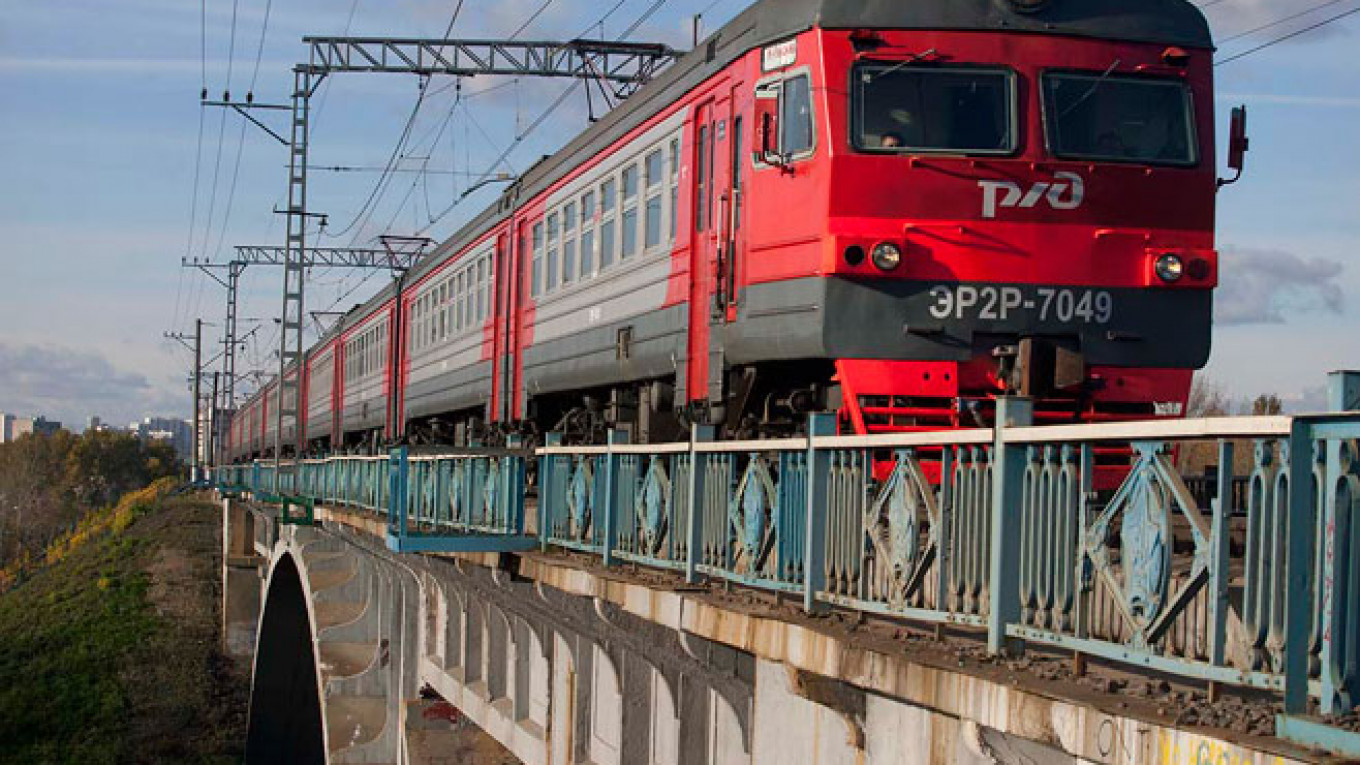Suburban commuters in many Russian regions may soon find themselves switching from trains to buses, as state subsidies freeze or disappear and regional governments are forced to retool their public transport strategy.
At a meeting chaired by Prime Minister Dmitry Medvedev on Monday the Cabinet supported the Economic Development Ministry's proposal to let individual regions determine whether they need train services or not, keeping in mind that government subsidies for the unprofitable sector will remain at current levels, Kommersant reported.
In 2013 commuter train services were profitable only in the Moscow region, St. Petersburg and in the republic of Adygea, Sochi's neighbor. Moscow and St. Petersburg account for about half of all suburban passenger traffic in Russia and ticket sales there cover up to 80 percent of expenses, compared to 30 to 50 percent in other regions.
Now regional governments dictate the necessary quantity of trains and set maximum ticket prices, sales of which do not cover rail service providers' costs. The regions are obliged to compensate for the difference, which they do only in part.
"In 2013, the regions compensated just 50 percent of all losses of their commuter train companies. Where will the rest come from? It will be compensated by Russian Railways [which partly owns the companies]," wrote Russian Railways' chief Vladimir Yakunin in his blog.
According to the Transportation Ministry, the deficits expected for 2014 are even worse.
The losses for regional commuter train companies because of fixed, economically unviable tariffs in 2014 will grow to 10 billion rubles ($277 million) and the level of subsidy is estimated at 41 percent, the ministry said in a statement.
Commuter train companies' use of infrastructure is also subsidized. They pay Russian Railways only 1 percent of invoices for use of the tracks. The monopoly gets the rest of the cost reimbursed from state coffers.
The amount of the subsidy to Russian Railways for infrastructure use by regional commuter train companies this year is set at 24 billion rubles, although the monopoly said it needed 32 billion rubles. Moreover, the proposal is to fix this lower amount for a 15-year period.
Russian Railways, as a key stakeholder in most of the regional commuter train companies and faced with mounting costs and debts, has cancelled more than 200 scheduled trains throughout the country.
The Cabinet has told Russian Railways that it should collect a total of 30 billion rubles from those companies which they now owe due to a lack of regional subsidies, Yakunin wrote in his blog.
Lev Ruzavin, passenger transport department analyst at the Institute of Natural Monopolies Research, said "Train services will develop only in regions where governors will be able to find an optimal mixture of train quantity and financing."
The Transportation Ministry predicts that under the current circumstances, commuter train services will be cancelled in unprofitable regions whose budgets are subsidized by the state. This means that most regions in Russia may soon be without train services. In 2013, out of 83 regions, 73 were unprofitable.
Giving regions the right to cancel trains in favor of buses is only logical and should have been done long ago, said Alexei Bezborodov, the head of Infranews transportation research agency.
"Organizing a bus service in regions other than Moscow and St. Petersburg will be 100 percent cheaper than paying for commuter trains," Bezborodov said.
"No compensations for commuter trains will be necessary in this case at all. Helping transportation companies arrange leasing payments for buses and dedicating the necessary routes for them would be all it takes to do the job," the analyst said.
Contact the author at [email protected]
A Message from The Moscow Times:
Dear readers,
We are facing unprecedented challenges. Russia's Prosecutor General's Office has designated The Moscow Times as an "undesirable" organization, criminalizing our work and putting our staff at risk of prosecution. This follows our earlier unjust labeling as a "foreign agent."
These actions are direct attempts to silence independent journalism in Russia. The authorities claim our work "discredits the decisions of the Russian leadership." We see things differently: we strive to provide accurate, unbiased reporting on Russia.
We, the journalists of The Moscow Times, refuse to be silenced. But to continue our work, we need your help.
Your support, no matter how small, makes a world of difference. If you can, please support us monthly starting from just $2. It's quick to set up, and every contribution makes a significant impact.
By supporting The Moscow Times, you're defending open, independent journalism in the face of repression. Thank you for standing with us.
Remind me later.






